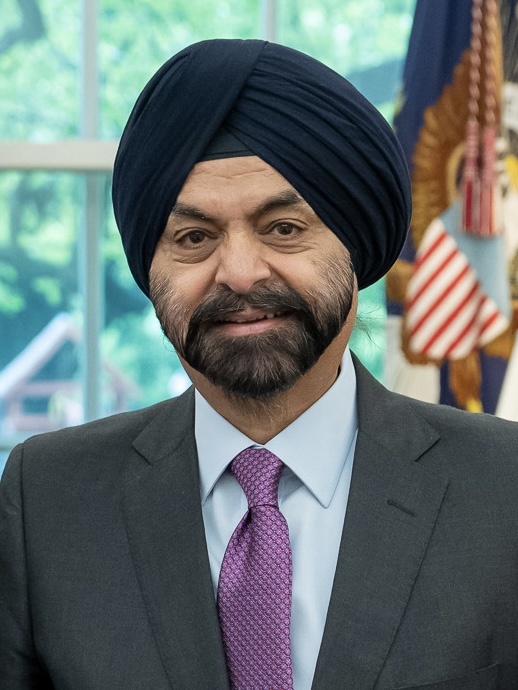Says Africa’s Per Capital Income Has Stagnated In 14 Years
In his first major speech, World Bank Group President Ajay Banga, on Friday lamented grinding poverty across the globe, especially in Sub-Saharan Africa, where per capita income has stagnated in all of 14 years. This, he assured, the group under is watch and with the help of donors and in collaboration with other multi-lateral agencies, is poised to address.
Banga, who addressed the ongoing 2023 Annual Meetings Plenary Meeting in Marrakech, Morocco, spoke an evolution that began months ago, and has birthed a new vision and mission of creating a livable planet free of poverty for the World Bank.
Noting that “time is of the essence,” he said the “urgency motivated us to write a new playbook – a new mission. One that will drive impactful development and lead to a better quality of life – access to clean air, clean water, education and decent health care.
“It is a mission that is inclusive of everyone, including women and young people;
“Resilient to shocks, including against climate and biodiversity crises, pandemics and fragility;
“And sustainable, through growth and job creation, human development, fiscal and debt management, food security and access to clean air, water, and affordable energy.”
With this vision, Banga continued, the bank is widening its aperture to reflect “a reality that the luxury of choice was for the last generation.
“To confront the intertwined challenges, our only option is to respond aggressively, simultaneously, and comprehensively,” and that adequate progress on public health is a mirage, “while rising temperatures change the patterns of infectious diseases and breed pandemics.
“We can’t help farmers expand crop yields and feed growing populations using techniques that were not designed for years long droughts.
“And we will never reliably connect entrepreneurs with markets if the roads they rely on for shipping get washed away every year in a flood.
“This is why we need a new playbook” which is centred around women and young people without which the bank would be “fighting with a hand behind our back.”
“Globally, women have not seen their participation in the labor force improve since 1990. And when they do get a seat at the table they aren’t paid equally. We cannot defeat poverty with half the world’s population on the sideline,” he stressed.
For young people, Banga said they can be the engine of the world’s future only if provided quality of life while growing up, and then a job with which comes “dignity, pride, the ability to provide for yourself and your family.
“Without a job – or the hope of one – human despair turns to anger, in those moments people grasp for any hand that offers a way out. Those costs can deliver irreparable harm on a society – or – on entire generations.
“The urgency and importance cannot be overstated. Our own estimates project that in the next 10 years, 1.1 billion young people across the Global South will become working age adults. Yet, in the same period and same countries, we are only expected to create 325 million jobs.
“The cost of inaction is unimaginable – this demographic dividend must not be allowed to become a demographic challenge,” he warned.
This vision and mission, he stressed further, “will test the sincerity of our ambition – it sets us on a journey that will require reimagined partnerships, a new way of working and thinking, an innovative plan to scale and replicate, additional resources, and optimism for what could be possible.”
Already, the group took its “first steps on this journey in April, squeezing $40bn over 10 years from our balance sheet by adjusting our loan to equity ratio.
“And over the last few months, we dug even deeper, creating a portfolio guarantee mechanism and launching a hybrid capital instrument.
“These new tools enable us to take more risks and boost our lending capacity further – all while preserving our AAA rating. Taken together we could provide $157 billion more in lending capacity over a decade.”
The new vision, he stressed, became necessary because digging deep today would reveal “people struggling to provide for themselves and their families as incomes have stagnated” across the world.
Worse still, he continued, “debt has increased throughout emerging markets – doubling in Africa – shackling countries to the ground just as they’re trying to rise.
“We are living in a world with alarming challenges but at a time of intensifying polarization and extremes,” just as beneath the surface, there is “a growing mistrust is pulling the Global North and South apart, complicating the prospect of progress.
“The Global South’s frustration is understandable. In many ways they are paying the price for the prosperity of others.
“When they should be ascendant, they’re concerned promised resources will never manifest, they feel energy rules aren’t applied universally, and they’re worried a burgeoning generation will be locked into a prison of poverty,” he stressed.
In the midst of all these, he said the task ahead of the World Bank Group is great, even as “it is easy to be consumed by a sense of despair.”
The situation, he continued, is however made easy by the fact that “in all corners of the globe, people are eager to go to work, and to create with their own hands. They want a better life for their children and grandchildren.
“I have felt that yearning among entrepreneurs in Nigeria, seen it in the proud eyes of artists in Indonesia, and touched it on the worn hands of farmers in Jamaica,” he added.
The bank, he believes, “has an obligation – a duty – to match their energy with a fierce determination. We must be the hand on the back – moving people forward. We must be an institution that exports optimism and impact.
“But we must change to make good on that promise and deliver on what is being demanded.








